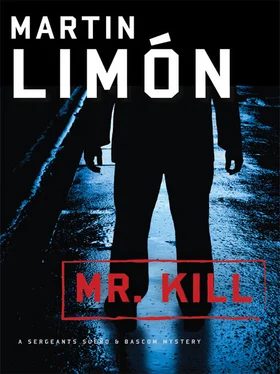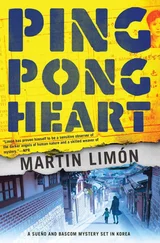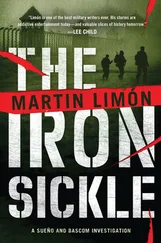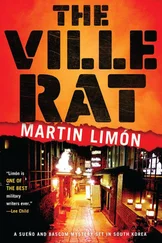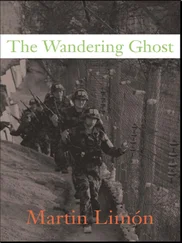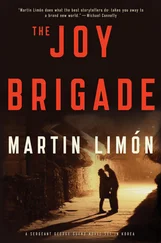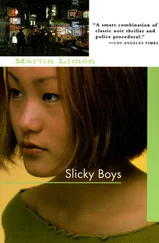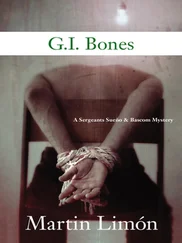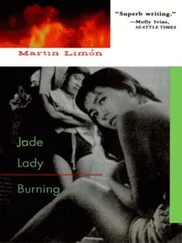Martin Limon - Mr. Kill
Здесь есть возможность читать онлайн «Martin Limon - Mr. Kill» весь текст электронной книги совершенно бесплатно (целиком полную версию без сокращений). В некоторых случаях можно слушать аудио, скачать через торрент в формате fb2 и присутствует краткое содержание. Жанр: Полицейский детектив, на английском языке. Описание произведения, (предисловие) а так же отзывы посетителей доступны на портале библиотеки ЛибКат.
- Название:Mr. Kill
- Автор:
- Жанр:
- Год:неизвестен
- ISBN:нет данных
- Рейтинг книги:4 / 5. Голосов: 1
-
Избранное:Добавить в избранное
- Отзывы:
-
Ваша оценка:
- 80
- 1
- 2
- 3
- 4
- 5
Mr. Kill: краткое содержание, описание и аннотация
Предлагаем к чтению аннотацию, описание, краткое содержание или предисловие (зависит от того, что написал сам автор книги «Mr. Kill»). Если вы не нашли необходимую информацию о книге — напишите в комментариях, мы постараемся отыскать её.
Mr. Kill — читать онлайн бесплатно полную книгу (весь текст) целиком
Ниже представлен текст книги, разбитый по страницам. Система сохранения места последней прочитанной страницы, позволяет с удобством читать онлайн бесплатно книгу «Mr. Kill», без необходимости каждый раз заново искать на чём Вы остановились. Поставьте закладку, и сможете в любой момент перейти на страницу, на которой закончили чтение.
Интервал:
Закладка:
“Did you see the foreigner?” I asked the stewardess.
She shook her head.
“Did you or the conductor see an American up here in car three?”
“No. And neither did any of the passengers. They’ve been talking among themselves nonstop since this thing happened. Only now, because the police are here, are they quiet.”
The Korean National Police are a mixed blessing. They maintain order, plenty of it. But sometimes they maintain that order at a high price, especially if you’re on the receiving end of a polished wooden nightstick.
“So no one saw a foreigner in car three?” I asked.
The stewardess nodded. I explained what she’d said to Ernie. He pushed open a door, and air rushed into the car. We both studied the metal walkway leading back toward car four.
“Where are the Americans?” I asked the stewardess. At the RTO, 8th Army’s Rail Transportation Office, tickets are issued free to G.I. s on official travel and sold at a discounted rate to those on leave or pass or other forms of unofficial travel. Eighth Army’s policy is to try, whenever possible, to keep all the Americans in the same passenger car.
The stewardess showed us with her eyes, glancing back at car four.
Lieutenant Shin approached. While the stewardess went over the same ground with him, I crouched and studied the interior of the bathroom. There wasn’t much to be seen. A little splashed water. A low toilet-porcelain embedded in the floor, Korean style, made for squatting; a small sink; and an unraveled roll of paper.
In the center aisle, men in blue smocks were trundling toward us. Stenciled on their chests, in white block hangul letters, was the word Kyongchal. Police. Keeping his voice low so the female victim couldn’t hear, Lieutenant Shin briefed them. These were the technicians who would be searching the bathroom for traces of blood or semen or hair. I was impressed. So was Ernie. In the Itaewon bar district, loaded with business girls who catered to American G.I. s, rape wasn’t taken nearly as seriously. As the technicians placed their gear on the floor and squatted down to get to work, one of them said in Korean, “First the mother of our country, and now this.”
Lieutenant Shin stationed a young cop near the bathroom to make sure that no one interfered with the crime scene or with the technicians.
What we did next was what Ernie had been aching to do since we arrived at Seoul Station, ever since we’d been subjected to the hatred in the eyes of the masses of Koreans surrounding us: he reached in his pocket and pulled out a shining set of brass knuckles. Slipping them over his fingers, he clenched his fist, enjoying the fit and heft of the finely crafted metal. Satisfied, he nodded. Lieutenant Shin took the lead. Together, we entered car four.
Autumn had fallen quickly in Korea. This was not unusual in itself-seasons change rapidly on the Korean peninsula-but it had also fallen early. Gray clouds appeared, and gloomy winds started to blow. A week and a half ago, August 15, it had been the twenty-ninth anniversary of Korea’s liberation from the occupying forces of the Japanese Imperial Army. The Japanese had taken over the country in 1910, stripping the Korean monarchy and the Korean legislature of any real power, and ruled the entire peninsula as a colony until 1945.
To mark this all-important day, Pak Chung-hee, the former army colonel and current authoritarian president of South Korea, had given a speech to a packed hall.
Unfortunately, a Japanese national, believed to be in the employ of North Korea, smuggled a gun into the hall and took a few potshots at the president. Pak Chung-hee crouched behind his heavily fortified podium and was not harmed. His security guards, however, pulled their own weapons and returned fire, and for a few mad seconds hot lead zinged all over the auditorium. One of the bullets struck the head of Yuk Young-soo, the wife of the president, who’d been sitting on the stage only a few feet from her husband. She was rushed to the hospital but declared dead on arrival.
Like most first ladies around the world, Yuk Young-soo was popular, much more popular than her husband. The death of such a vital woman, the mother of three young children, shocked the country, sending it into mourning. Only hours after she died, the blue skies of summer disappeared with the onset of autumn.
Does a country have a mood? Maybe. Maybe not. We only read our own moods into what we see around us. But if countries do have moods, the mood of the Republic of Korea was surly right now. Surly to the point of tipping over into rage.
As we entered car four, rows of passengers gaped at us. They were mostly Koreans, but there were a few American faces scattered among them. While Lieutenant Shin and the ranking sergeant in his detail asked for identification and briefly interviewed the Korean nationals, Ernie and I studied the Americans. The faces were confused and concerned, but nobody bolted for the door.
I pulled out my badge and held it up.
“Good morning, everyone. I’m Agent Sueno. This is Agent Bascom. We’re going to be asking you some questions. First, I’d like everyone to pull out their identification and their travel orders.”
“What if you don’t have travel orders?” one of the G.I. s asked.
“Then your leave orders will have to do,” Ernie replied.
Every American G.I. had to be able to prove that he had permission to be away from his compound. If he didn’t, we’d report him to his unit and nonjudicial punishment could ensue. This was punishment short of court-martial, like restriction to the barracks or forfeiture of pay for less than thirty days.
While Ernie stayed inside the car, I took the American passengers outside onto the platform, one by one, and interviewed them. I wrote down their names, units of assignment, serial numbers, and the issuing headquarters of their temporary duty instructions. G.I. s don’t travel much in Korea, unless they’re under what we call TDY-temporary duty-orders. There were a total of seven G.I. s in car number four. One was a courier carrying a packet of classified documents. Another was on his way home on emergency leave orders; apparently he had a child back home who was gravely ill. Four of the G.I. s were Signal Corps technicians on their way to do some repair work at the 42nd Long Lines Battalion at Camp Coiner. The last G.I. was an officer under orders to report to 8th Army headquarters for a SOFA Conference, a joint ROK-US Status of Forces Agreement confab.
Nobody was on unauthorized travel. Nobody was absent without leave. At least, that’s the way it seemed so far. The paperwork they showed me could have been forged. It was even possible that their ID cards were phony. Unlikely, but possible. Later today, Ernie and I would be checking out the validity of their stories, but for the moment I was taking what they told me at face value.
When everyone had been interviewed, Ernie and I compared notes with Lieutenant Shin. He had the passenger manifest, which had been radioed up from Pusan and Taegu and Taejon and then painstakingly transcribed by hand by the head clerk in the Seoul Station dispatch office. The manifest didn’t have names, but all assigned seats were indicated, along with an annotation indicating where the passenger boarded the train: Pusan, Taegu, or Taejon. The manifest also indicated those tickets purchased by 8th Army RTO. About 80 percent of the seats were filled when the train left the Pusan Station. Pusan is a bustling international port and the second largest city in the country. Seoul is not only the capital of the country but also the largest city by far-with a population of eight million-and the home of most of the country’s industrial production. As such, the majority of the passengers on the Pusan-to-Seoul Blue Train travel the entire route. Still, at Taegu twenty-two people disembarked and forty boarded. At Taejon less than a dozen disembarked and about thirty boarded the Blue Train to Seoul. At that point, every seat on the train was occupied but five.
Читать дальшеИнтервал:
Закладка:
Похожие книги на «Mr. Kill»
Представляем Вашему вниманию похожие книги на «Mr. Kill» списком для выбора. Мы отобрали схожую по названию и смыслу литературу в надежде предоставить читателям больше вариантов отыскать новые, интересные, ещё непрочитанные произведения.
Обсуждение, отзывы о книге «Mr. Kill» и просто собственные мнения читателей. Оставьте ваши комментарии, напишите, что Вы думаете о произведении, его смысле или главных героях. Укажите что конкретно понравилось, а что нет, и почему Вы так считаете.
